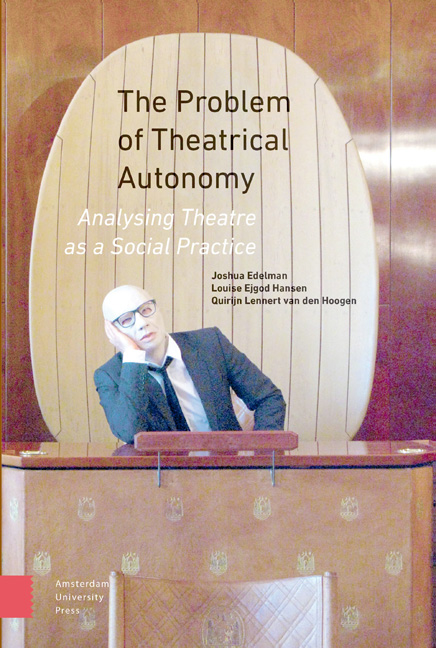Book contents
- Frontmatter
- Acknowledgements
- Contents
- List of Figures and Tables
- Introduction
- 1 How Can we Define Autonomy?
- 2 The Concept of Artistic Autonomy
- 3 Autonomy in the Contemporary Theatre
- 4 How Agents in Theatre Fields Make use of Claims to Autonomy
- 5 How Theatre Organization Shapes Claims to Autonomy
- 6 How Claims to Autonomy Serve those Outside Theatre Fields
- Conclusion
- References
- About the Authors
- Index
2 - The Concept of Artistic Autonomy
Published online by Cambridge University Press: 12 February 2021
- Frontmatter
- Acknowledgements
- Contents
- List of Figures and Tables
- Introduction
- 1 How Can we Define Autonomy?
- 2 The Concept of Artistic Autonomy
- 3 Autonomy in the Contemporary Theatre
- 4 How Agents in Theatre Fields Make use of Claims to Autonomy
- 5 How Theatre Organization Shapes Claims to Autonomy
- 6 How Claims to Autonomy Serve those Outside Theatre Fields
- Conclusion
- References
- About the Authors
- Index
Summary
The American philosopher Casey Haskins (2000) has noted that the debate over artistic autonomy has received more attention and provoked more passion than this relatively narrow question of aesthetic theory might seem to warrant. He argues that the reason for that is that questions of the aesthetic realm and its freedom have served as metaphors for morality and politics, explicitly or otherwise. The intellectual history of the notion of artistic autonomy is extensive. In this chapter we will position Bourdieu's notion of specific value within this rich history of philosophical and sociological thinking, as Bourdieu did not somehow magically think up this idea of specific value. On the contrary, he stands in a long line of philosophers and social scientists. In this chapter, we will look at how some of the participants in this debate have described art's autonomy and what we can learn from the differences with Bourdieu. We will put Bourdieu's views into dialogue with thinkers both before and after his time. Thus, the chapter does not present a full philosophical history of the concept of autonomy. This task, we leave to philosophers. Here, we merely expand our understanding of the concept so productive use of it can be made when analysing theatre systems.
We do this by first comparing Bourdieu's thoughts to the functionalist tradition in the philosophy of art, which is based on the Kantian aesthetics that Schiller applied to theatre. This line of reasoning focuses on the effects aesthetic experiences have on the observer. We will also avail ourselves of Niklas Luhmann's system theoretical perspective, as his theory of art as a social system contributes to the functional perspective with an understanding of what the arts do for audiences and thus in society (Van Maanen 2009). In our view, understanding this perspective is necessary, especially for our analysis of the relationship between the theatrical field and cultural policy.
In addition to the functionalist understanding of the autonomy of art, we present the institutionalist tradition represented by Danto, Dickie and Becker. They locate the social specificity of arts not in the effects it has for its audience, but in the institutional arrangements in and around the acts of art making and art perceiving.
- Type
- Chapter
- Information
- The Problem of Theatrical AutonomyAnalysing Theatre as a Social Practice, pp. 51 - 74Publisher: Amsterdam University PressPrint publication year: 2016



